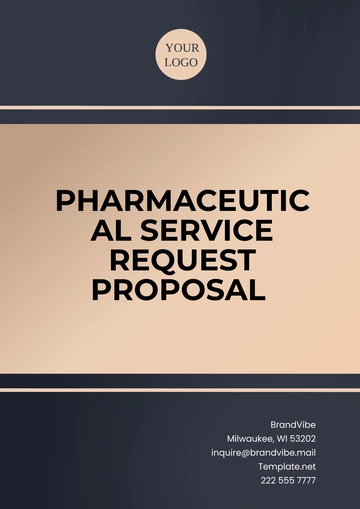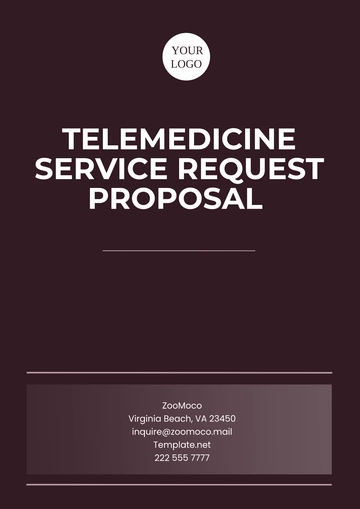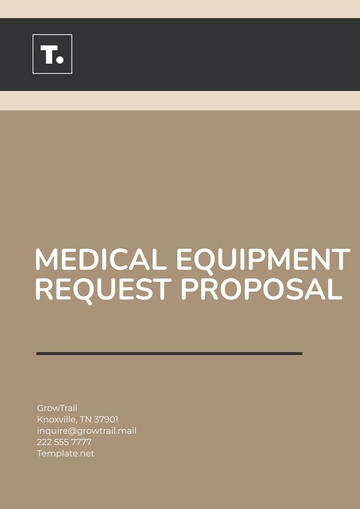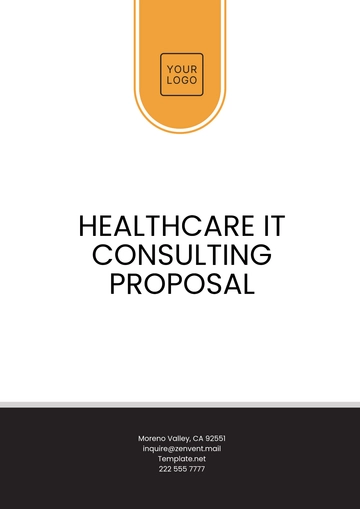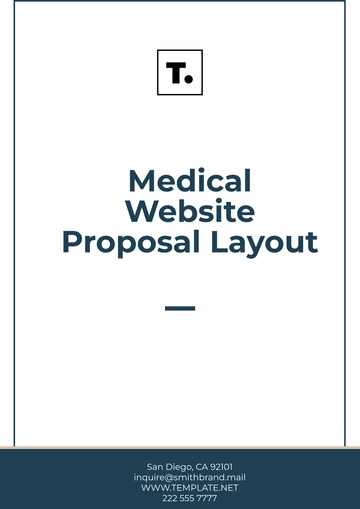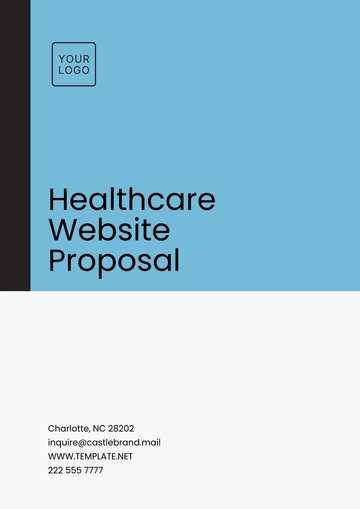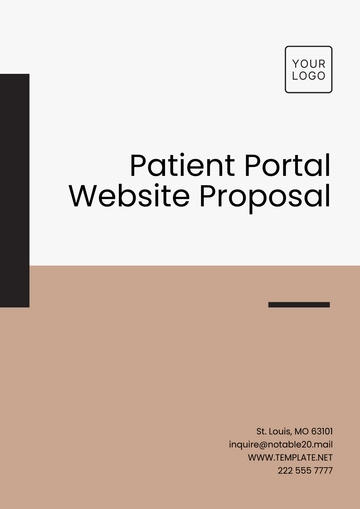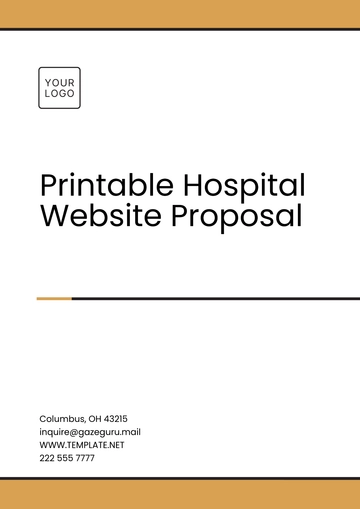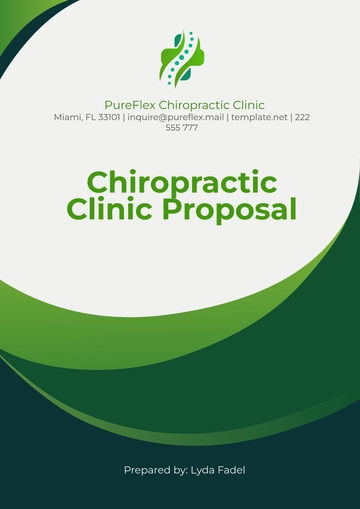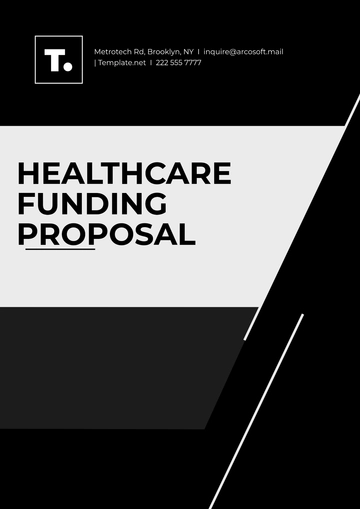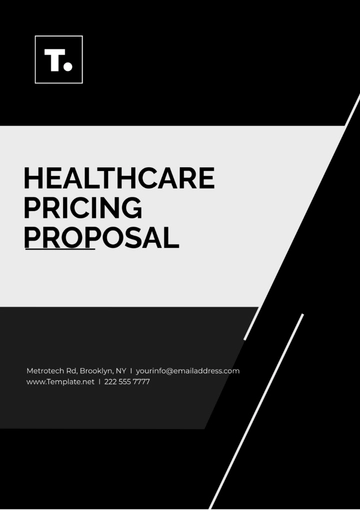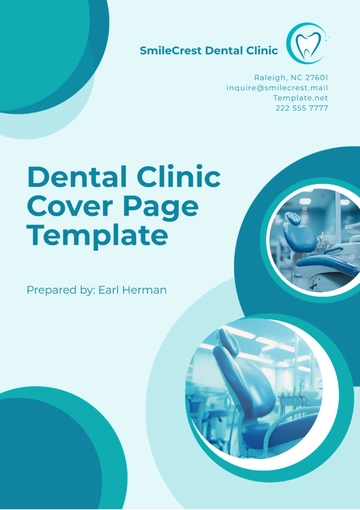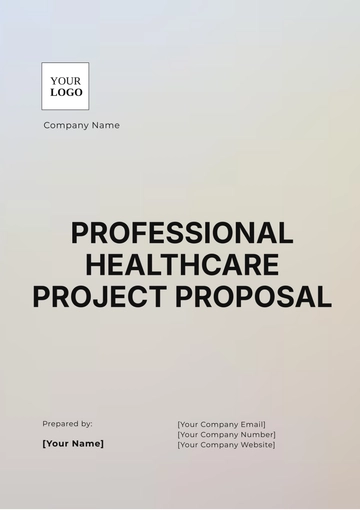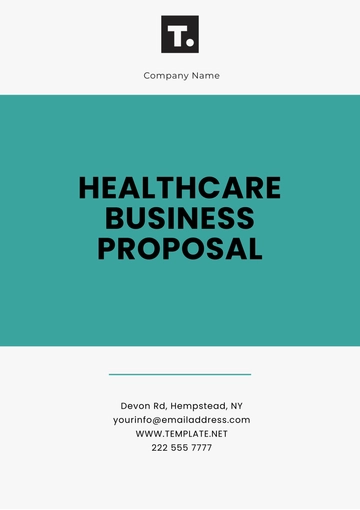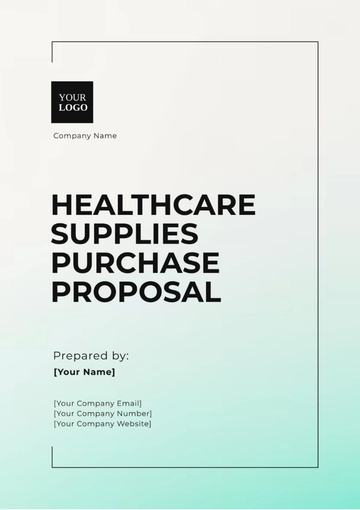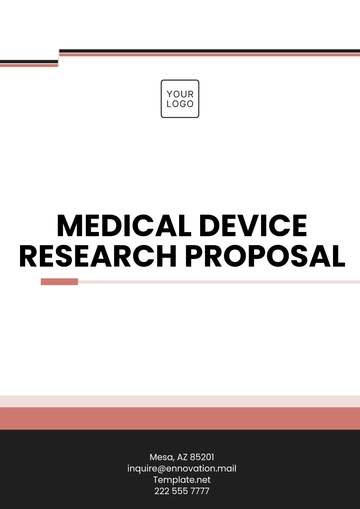Free Medical Device Research Proposal
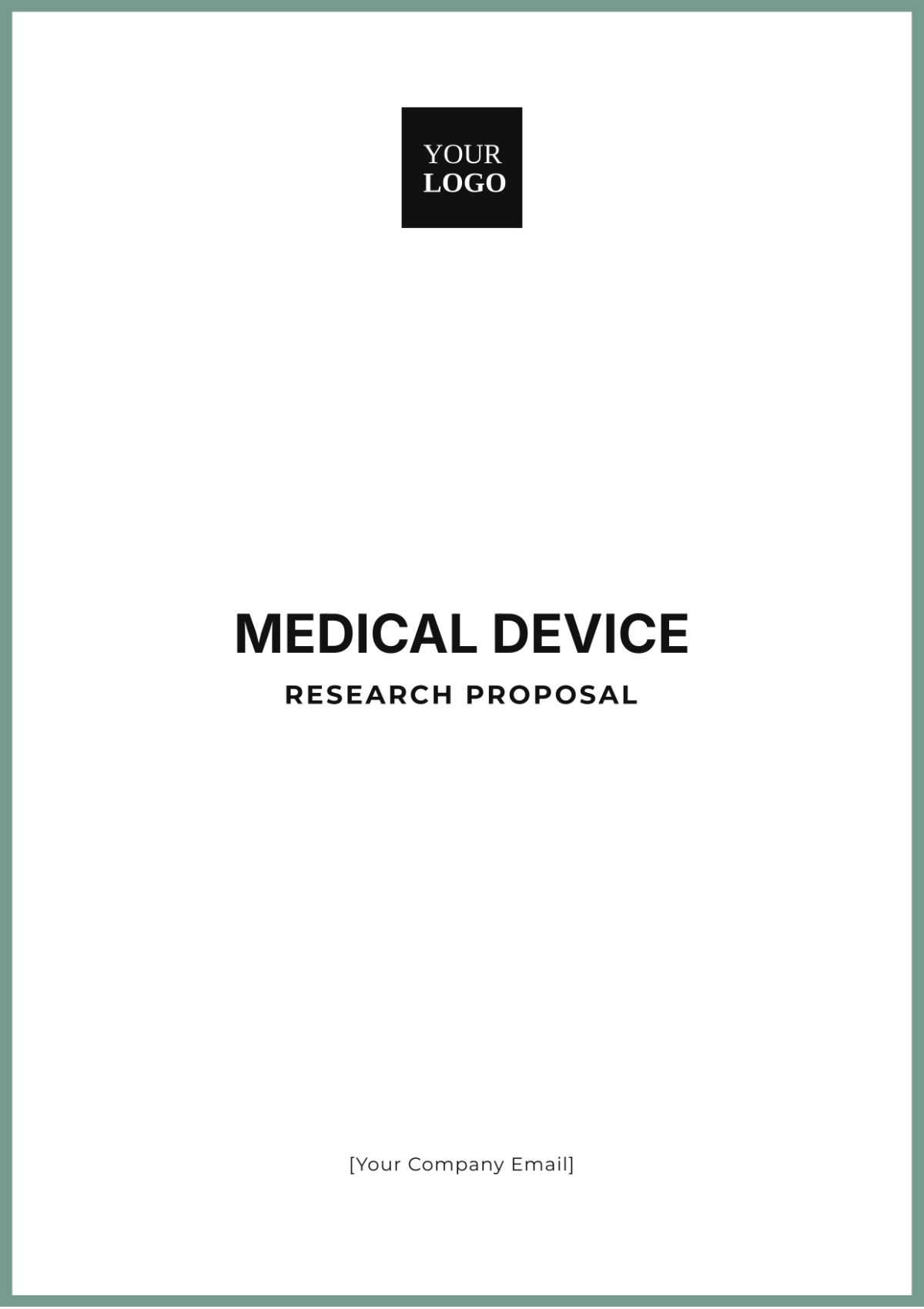
Prepared By: [Your Name]
I. Introduction
Medical devices play a pivotal role in modern healthcare, significantly contributing to the diagnosis, prevention, and treatment of various diseases. This research proposal focuses on the development, rigorous testing, and evaluation of a novel medical device aimed at enhancing patient outcomes. By addressing the current limitations in the market, this device has the potential to fill critical gaps in healthcare delivery, ultimately leading to improved patient care and reduced healthcare costs.
II. Background and Significance
Over the past few decades, the field of medical devices has seen remarkable growth, driven by rapid technological advancements and an enhanced understanding of human biology. Despite these advances, certain medical needs remain unmet by existing devices, leading to suboptimal patient outcomes and increased healthcare costs. The proposed device seeks to address these shortcomings by introducing innovative features and functionalities that are not currently available.
This project is particularly significant as it targets a high-need area where current technologies fail to deliver desired outcomes. The success of this device could revolutionize treatment protocols, reduce the burden on healthcare systems, and improve the quality of life for patients.
III. Objective
The primary objective of this research is to design, develop, and evaluate a new medical device that surpasses existing technologies in terms of efficacy, safety, and cost-effectiveness. The research will also assess the device's potential to improve patient outcomes and reduce the incidence of complications associated with current treatment modalities.
IV. Research Questions
What are the specific limitations of current medical devices in the target area?
How can the new device improve patient outcomes over current technologies?
What are the pros, cons, and risks of the new device?
What are the device's economic impacts on costs and healthcare savings?
V. Methodology
A. Design and Development
Conceptualization: Identify crucial features for the medical need.
Design Specifications: Draft detailed design specs: materials, components, usage.
Prototype Development: Develop a working prototype for initial evaluation.
B. Testing and Evaluation
Preclinical Testing: Conduct laboratory and animal studies to assess the safety, functionality, and potential effectiveness of the prototype. This phase will also include biocompatibility tests and mechanical stress tests.
Clinical Trials: After successful preclinical tests, initiate human trials in phases (Phase I, II, and III) following strict regulatory guidelines. The focus will be on evaluating the device’s efficacy, safety, and user-friendliness in real-world clinical settings.
Post-Market Surveillance: Upon regulatory approval and market release, continuous monitoring will be conducted to gather data on the device's long-term performance, safety, and patient outcomes. This phase will involve collecting feedback from users, tracking adverse events, and making iterative improvements as necessary.
VI. Expected Outcomes
The expected outcomes of this research include:
Clinical Improvements: The device is anticipated to improve clinical outcomes by addressing the limitations of current technologies. This could lead to faster recovery times, fewer complications, and overall better health results for patients.
Safety Enhancements: By incorporating advanced safety features and rigorous testing, the device aims to minimize risks associated with its use, leading to a reduction in adverse events.
Cost-Effectiveness: The device is designed to be more cost-efficient than existing alternatives, potentially lowering healthcare costs by reducing the need for repeat procedures and hospital stays.
Stage | Objective | Methods | Outcome |
|---|---|---|---|
Design and Development | Conceptualize and create a prototype | Blueprints, prototyping | Functional prototype |
Preclinical Testing | Evaluate safety and functionality | Laboratory, animal studies | Preclinical data |
Clinical Trials | Assess efficacy and safety | Human trials | Clinical data |
Post-Market Surveillance | Monitor long-term performance | Data collection, analysis | Performance data |
VII. Timeline
Year 1: Design and development of the prototype, including initial testing for functionality and safety.
Year 2: Preclinical testing, focusing on laboratory and animal studies to validate the device’s performance.
Year 3-4: Clinical trials, starting with small-scale trials and progressing to larger, more comprehensive studies.
Year 5 onwards: Post-market surveillance, including long-term monitoring and iterative improvements based on real-world data.
VIII. Budget
Item | Cost |
|---|---|
Design and Development | $500,000 |
Preclinical Testing | $300,000 |
Clinical Trials | $1,000,000 |
Post-Market Surveillance | $200,000/year |
IX. References
ASTM International. (2053). F2900-13: Standard guide for characterization of hydrogels used in regenerative medicine. West Conshohocken, PA: ASTM International.
Smith, J., & Brown, L. (2058). Advances in medical device technology. Journal of Biomedical Engineering, 45(2), 123-135.
U.S. Food and Drug Administration (FDA). (2060). Premarket notification 510(k). Retrieved from FDA website.
- 100% Customizable, free editor
- Access 1 Million+ Templates, photo’s & graphics
- Download or share as a template
- Click and replace photos, graphics, text, backgrounds
- Resize, crop, AI write & more
- Access advanced editor
Innovate in healthcare with Template.net's Medical Device Research Proposal Template. This editable and customizable template helps structure your proposal, covering research objectives, technical approaches, and expected outcomes. Editable in our AI Editor Tool, it ensures your medical device research proposal is clear, detailed, and persuasive, enhancing your chances of securing support for groundbreaking medical device development.
You may also like
- Research Proposal
- Proposal Request
- Project Proposal
- Grant Proposal
- Photography Proposal
- Job Proposal
- Budget Proposal
- Marketing Proposal
- Branding Proposal
- Advertising Proposal
- Sales Proposal
- Startup Proposal
- Event Proposal
- Creative Proposal
- Restaurant Proposal
- Blank Proposal
- One Page Proposal
- Proposal Report
- IT Proposal
- Non Profit Proposal
- Training Proposal
- Construction Proposal
- School Proposal
- Cleaning Proposal
- Contract Proposal
- HR Proposal
- Travel Agency Proposal
- Small Business Proposal
- Investment Proposal
- Bid Proposal
- Retail Business Proposal
- Sponsorship Proposal
- Academic Proposal
- Partnership Proposal
- Work Proposal
- Agency Proposal
- University Proposal
- Accounting Proposal
- Real Estate Proposal
- Hotel Proposal
- Product Proposal
- Advertising Agency Proposal
- Development Proposal
- Loan Proposal
- Website Proposal
- Nursing Home Proposal
- Financial Proposal
- Salon Proposal
- Freelancer Proposal
- Funding Proposal
- Work from Home Proposal
- Company Proposal
- Consulting Proposal
- Educational Proposal
- Construction Bid Proposal
- Interior Design Proposal
- New Product Proposal
- Sports Proposal
- Corporate Proposal
- Food Proposal
- Property Proposal
- Maintenance Proposal
- Purchase Proposal
- Rental Proposal
- Recruitment Proposal
- Social Media Proposal
- Travel Proposal
- Trip Proposal
- Software Proposal
- Conference Proposal
- Graphic Design Proposal
- Law Firm Proposal
- Medical Proposal
- Music Proposal
- Pricing Proposal
- SEO Proposal
- Strategy Proposal
- Technical Proposal
- Coaching Proposal
- Ecommerce Proposal
- Fundraising Proposal
- Landscaping Proposal
- Charity Proposal
- Contractor Proposal
- Exhibition Proposal
- Art Proposal
- Mobile Proposal
- Equipment Proposal
- Student Proposal
- Engineering Proposal
- Business Proposal
